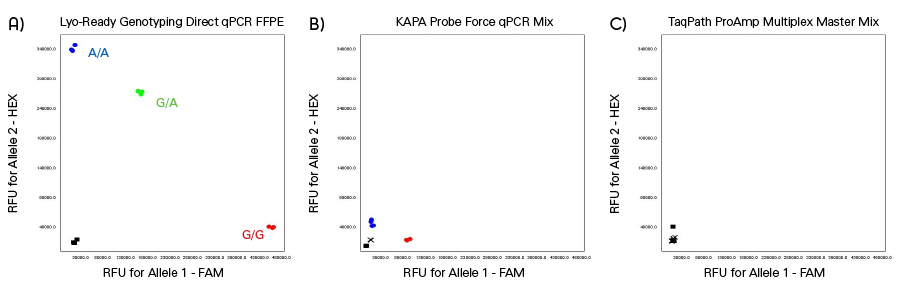Lyo-Ready™ Genotyping Direct qPCR FFPE
Lyo-Ready Genotyping Direct qPCR FFPE is a glycerol-free, one tube formulation compatible with all dual-label probe chemistries for detection of genetic variants, such as single nucleotide variants and copy number variations.
Have questions about a product?
Contact us to learn more about Meridian’s molecular or immunoassay reagent portfolio. We want to hear from you!
Screening FFPE lung tissue for tumor associated PDGFRA1 gene mutations

Healthy FFPE lung tissue (WT) and lung tumor tissue containing the tumor angiogenesis associated PDGFRA1 mutation were run with A/ Lyo-Ready Genotyping Direct qPCR FFPE (MDX168) following extraction with the extraction buffers provided or purified using Qiagen QIAamp DNA FFPE Tissue Extraction Kit and analysed with B/ KAPA Probe Force qPCR Mix (Roche) and C/ TaqPath ProAmp Multiplex Master Mix (ThermoFisher). Homozygous Allele G (red) and allele A (blue) and heterozygous Allele G/A (green) with a NTC (black) and x for undetermined. The results illustrate that MDX168 shows greater allelic discrimination and tighter clustering even in the presence of crude FFPE tissue extracts in comparison to other commercially available master mixes using purified gDNA.
Lyo-Ready™ Genotyping Direct qPCR FFPE, MDX168
Available in 1,000 Unit or 10,000 Unit aliquots
SNPs (single nucleotide polymorphisms) or point mutations are the most common types of genetic variation and comprise the major part of phenotype diversity between individuals. SNPs can be responsible for both resistance or susceptibility to a certain disease and once individual SNPs have been identified by sequencing, they can be used for pharmacogenetics, in evaluating and predicting a patient’s response to treatment and risk of adverse events, or for diagnostics, such as in cystic fibrosis screening. Although blood is an ideal source for genotyping analysis, formalin-fixed paraffin-embedded (FFPE) tumor tissues are also widely used and constitute valuable resources for retrospective studies due to the possibility of long-term storage at room temperature. Despite the extremely time-consuming and labour-intensive workflows, success rate of genotyping assays using DNA purified from such samples remains low.
To minimize the workflow to isolate DNA from FFPE tissue, Meridian has created the Lyo-Ready Genotyping Direct qPCR FFPE, this allows digestion of the tissue in a single tube, without the need for purification, greatly reducing the risk of sample damage, loss and contamination whilst simplifying and accelerating the analysis process. Furthermore, it can be used in a liquid format or lyophilized format to create ambient-temperature stable assays, making it ideal for high throughput.
Catalogs & Brochures
Lyo-Ready Genotyping Direct DNA qPCR FFPELyo-Ready Genotyping Direct DNA qPCR FFPE
Lyo-Ready Genotyping Direct qPCR BloodLyo-Ready Genotyping Direct qPCR Blood
FAQs: Lyo-Ready Genotyping Direct qPCR FFPE
Allelic discrimination are methods to discriminate between two or more sequence changes at a particular gene locus. Typically, one allele (“wild type” DNA sequence) is common, and other alleles (mutation) is rare. In a SNP there are 3 genotypes: – a diploid homozygote (two wild type alleles (PP)), a diploid homozygote (two mutant alleles (pp)) and a heterozygote (one wild type allele and one mutant allele (Pp)).
SNPs (single nucleotide polymorphisms) help predict an individual’s resistance or susceptibility to certain drugs (pharmacogenetics), susceptibility to environmental factors such as toxins, and risk of developing diseases. SNPs can also be used to track the inheritance of disease-associated genetic variants within families.
qPCR (Real-time PCR) enables you to screen known SNPs. The benefits of qPCR are that it is easy, accurate, and can scale to high throughput. The bioinformatic analysis is also less complex than for other technologies, such as sequencing and microarrays.
5′-nuclease (TaqMan) allelic discrimination uses a primer pair to amplify the target area and two allele-specific probes to detect your target SNP alleles and report the genotypes of your samples. Unlike normal qPCR, in genotyping the fluorescence level is only measured at the end of the PCR and the results are displayed on a scatter plot, allowing hundreds of assays to be run and analysed in parallel.
FFPE specimens are affected by numerous factors including fixative pH (that can lead to cross-linking of the DNA), duration of tissue fixation, age and storage condition of tissue blocks. This leading to extremely time-consuming, labour-intensive workflows that all result in fragmented DNA and consequently, the success rate of genotyping DNA purified from such samples is low.
Yes, the Lyo-Ready™ Genotyping Direct qPCR FFPE can be used as a liquid mix or lyophilized and stored at ambient temperature without needing to change the reaction conditions and lyophilization/storage will not affect the sensitivity of the test.
Yes, we sell these as MDX004 Tissue Extract-PCR Buffers.
Get In Touch With A Specialist
Have questions about a product? Want to learn more about Meridian’s molecular or immunoassay reagent portfolio? We want to hear from you!